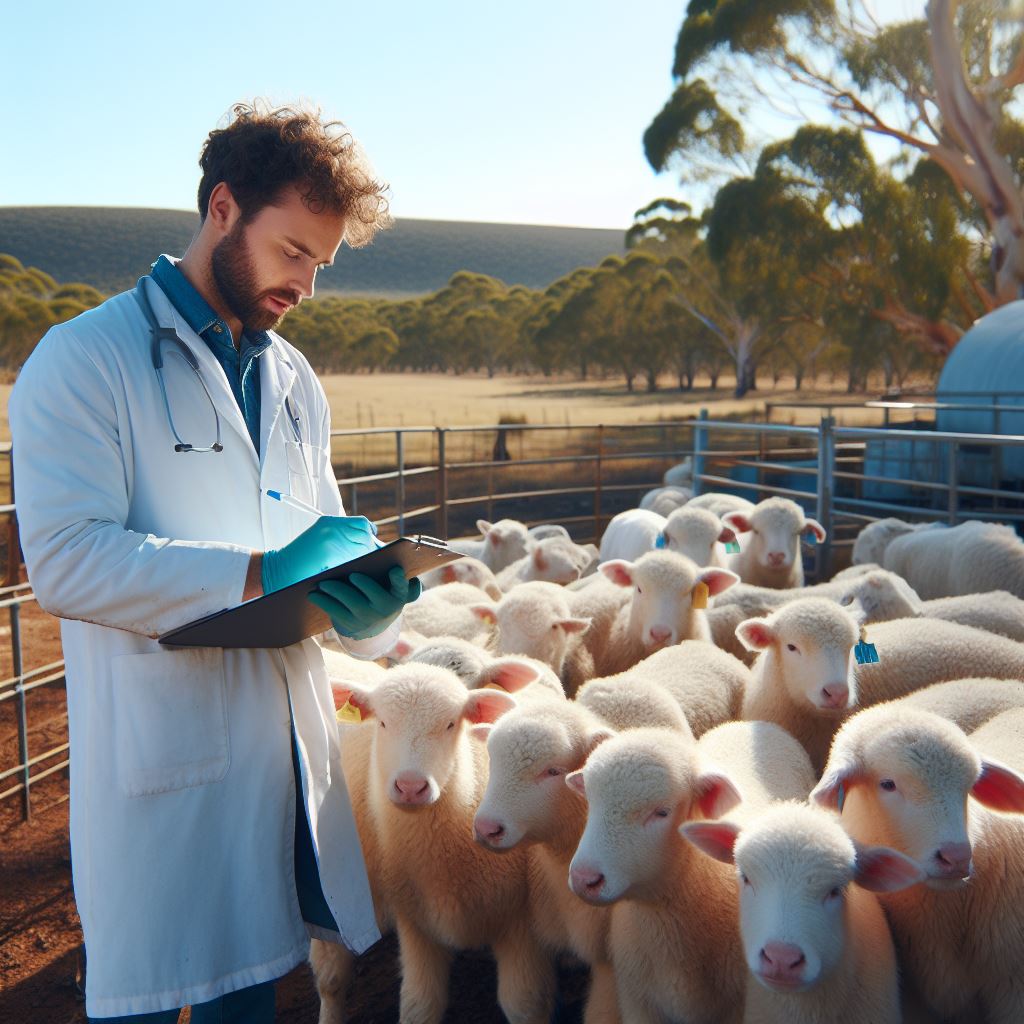Introduction
Agriculture policy plays a crucial role in shaping the agricultural sector.
Scientists’ involvement is vital as they bring scientific research findings to inform policy-making.
Agriculture policy sets the framework for the agricultural sector, guiding its development and addressing various challenges.
It encompasses regulations, laws, and programs that aim to support and promote sustainable farming practices, food security, and rural development.
Agriculture policy directly impacts farmers, consumers, and the environment.
Scientists’ involvement in shaping agriculture policy is essential due to their expert knowledge and understanding of agricultural systems.
Their research findings provide evidence-based insights into the potential impact of different policies on food production, environmental sustainability, and human health.
Scientists can assess the feasibility and effectiveness of proposed policies, identifying potential risks and opportunities.
By actively participating in policy discussions, scientists can ensure that policy decisions are evidence-based and aligned with scientific knowledge.
They can offer expertise on emerging technologies such as precision agriculture, biotechnology, and climate-smart farming practices.
Their objective assessment can help policymakers make informed decisions that balance the needs of agriculture, society, and the environment.
Moreover, scientists can contribute to the development of policies that address complex issues such as climate change, water scarcity, and biodiversity loss.
Their research can guide the implementation of mitigation strategies and adaptation measures.
Scientists’ involvement also helps ensure transparency and accountability in decision-making processes.
In fact, agriculture policy is crucial for the sustainable development of the agricultural sector.
Scientists play a vital role in shaping agriculture policy by bringing their expertise and scientific research findings to inform decision-making.
Their involvement ensures that policies are evidence-based, effective, and aligned with societal and environmental needs.
Collaborative efforts between scientists and policymakers are essential to drive positive change in the agricultural sector.
Role of Scientists in Agriculture Policy
Expertise and knowledge in various fields of agriculture
Scientists play a crucial role in agriculture policy by providing their expertise and deep knowledge in various fields.
They have in-depth understanding of crop production, soil science, pest management, and other agricultural practices.
With their expertise, scientists can guide policy-makers in making informed decisions on issues related to agriculture.
Their knowledge helps in developing policies that promote sustainable practices and ensure food security for the future.
Contribution to evidence-based decision making
Scientists gather and analyze data to provide evidence-based information for agriculture policy-making.
They conduct research which helps in understanding the impact of different practices on crop yields, soil health, and environmental sustainability.
By studying various factors, such as weather patterns, market trends, and technological advancements, scientists can guide policy-makers in making effective decisions.
Their research contributes to the development of policies that are based on scientific evidence, ensuring the best outcomes for farmers and the environment.
Identifying and addressing agricultural challenges
Scientists play a vital role in identifying and addressing the challenges faced by the agricultural sector.
They conduct research to study the impact of climate change, pests, diseases, and other factors on crop production.
By understanding these challenges, scientists can recommend strategies and technologies to mitigate their effects.
Through their research, they provide solutions to improve farming practices, increase productivity, and reduce losses.
Their input helps in the development of policies that address specific challenges and support the growth of the agricultural sector.
Ensuring sustainable and resource-efficient practices
Scientists are instrumental in developing policies that promote sustainable and resource-efficient practices in agriculture.
Your Personalized Career Strategy
Unlock your potential with tailored career consulting. Get clear, actionable steps designed for your success. Start now!
Get StartedThey study the impact of various farming methods on the environment, such as the use of chemical fertilizers and pesticides.
By evaluating the latest scientific findings, they guide policy-makers to adopt practices that minimize the negative environmental impact.
Scientists also promote the use of renewable resources, such as organic fertilizers and precision farming techniques.
Their involvement ensures that agriculture policies prioritize sustainability, conservation of resources, and long-term viability.
In general, scientists play a crucial role in shaping agriculture policy through their expertise, evidence-based decision making, identification of challenges, and promotion of sustainable practices.
Their knowledge and research provide the necessary foundation for policy-makers to develop strategies that ensure the long-term success and sustainability of the agricultural sector.
Read: The Economics of Farming in Australia Unveiled
Challenges Faced by Scientists in Influencing Agriculture Policy
Agriculture policy plays a crucial role in shaping the future of our food systems, environmental sustainability, and overall well-being. However, scientists face numerous challenges when it comes to influencing these policies.
In this section, we will explore and discuss the major hurdles scientists encounter while trying to make their voices heard.
Limited access to policymakers
One of the significant challenges faced by scientists is the limited access they have to policymakers.
Due to bureaucratic processes and the influence of special interest groups, scientists often struggle to get their research findings directly to the policymakers who ultimately shape agriculture policies.
This lack of direct communication hinders their ability to provide crucial inputs and recommendations for evidence-based policy-making.
Balancing scientific objectivity and political pressures
Scientists strive to maintain scientific objectivity, grounded in empirical evidence and rigorous research. However, when it comes to influencing agriculture policies, they often encounter political pressures that may compromise their objectivity.
Balancing the need to present unbiased scientific information while satisfying the expectations of policymakers and interest groups can be a delicate and challenging task.
Public perception and skepticism towards scientific research
Public perception and skepticism towards scientific research create another hurdle for scientists in influencing agriculture policy.
Lack of awareness, misinformation, and the erosion of public trust in science can lead to the dismissal of well-established scientific findings, making it difficult for scientists to promote evidence-based solutions.
Addressing this issue requires effective science communication and fostering trust through transparent and inclusive dialogue.
Lobbying and industry influence on policy decisions
Lobbying and industry influence pose a significant obstacle for scientists trying to influence agriculture policy.
Powerful interest groups, motivated by profit and self-interest, can exert considerable influence on policymakers.
This influence can sometimes override the scientific evidence and steer policies towards industry-friendly approaches that may not align with long-term sustainability or public well-being.
In essence, scientists face several challenges when attempting to influence agriculture policy.
Limited access to policymakers, the need to balance scientific objectivity with political pressures, public skepticism towards scientific research, and the influence of lobbying and industry interests are among the key hurdles.
Overcoming these challenges requires collaborative efforts, transparency, effective science communication, and the recognition of the vital role that scientific research plays in shaping evidence-based agricultural policies.
Read: Exploring Permaculture Practices in Australia
Impact of Scientists’ Voice on Agriculture Policy
Agriculture policy plays a crucial role in shaping the future of farming practices and the overall well-being of our planet. Over the years, scientists have emerged as key stakeholders in influencing agriculture policy decisions.
Their expertise and voice have led to several successful policy changes, development of sustainable practices, improved food safety measures, and increased investment in research and development.
Let’s explore some examples of how scientists have impacted agriculture policy:
Stand Out with a Resume That Gets Results
Your career is worth more than a generic template. Let us craft a resume and cover letter that showcase your unique strengths and help you secure that dream job.
Get HiredExamples of successful policy changes influenced by scientists
- Implementation of stricter regulations on pesticide use to protect human health and the environment.
- Introduction of agricultural subsidies for organic farming practices to promote sustainability.
- Development of genetically modified crops and policies governing their use to enhance productivity.
- Creation of animal welfare regulations to ensure the humane treatment of livestock.
- Enforcement of regulations to reduce water pollution from farming activities.
Improved environmental sustainability practices
Scientists have advocated for the adoption of sustainable farming practices that minimize environmental impact. As a result, agriculture policies have been modified to encourage:
- Conservation tillage methods to reduce soil erosion and improve soil health.
- Use of cover crops to prevent nutrient runoff and enhance biodiversity.
- Implementation of integrated pest management techniques to control pests without excessive chemical use.
- Promotion of agroforestry systems to improve carbon sequestration and mitigate climate change.
- Adoption of precision agriculture technologies to optimize resource use and reduce waste.
Enhanced food safety measures
Scientists’ voice has played a crucial role in establishing food safety regulations to protect consumers from potential risks. Agriculture policy changes influenced by scientists include:
- Implementation of strict standards for the use of antibiotics and hormones in animal farming.
- Introduction of traceability systems to ensure the integrity of the food supply chain.
- Mandatory labeling of genetically modified organisms (GMOs) to inform consumers’ choices.
- Enhanced inspection and monitoring procedures to prevent contamination and disease outbreaks.
- Development of safety guidelines for agricultural workers to protect their health and well-being.
Increased investment in research and development
Scientists’ voices have successfully advocated for increased funding in agricultural research and development. This has led to:
- Development of innovative technologies and practices to improve crop yields and farm efficiency.
- Advancements in plant breeding techniques for disease resistance, drought tolerance, and improved nutrition.
- Exploration of alternative protein sources such as plant-based and lab-grown meat products.
- Investigations into climate-smart agriculture practices to adapt to changing environmental conditions.
- Expansion of research on sustainable pest control methods for reduced chemical reliance.
In review, the impact of scientists’ voice on agriculture policy cannot be underestimated.
Their expertise and evidence-based recommendations have led to successful policy changes, improved environmental sustainability practices, enhanced food safety measures, and increased investment in research and development.
It is essential to continue listening to scientists and incorporating their insights into agriculture policy decisions to ensure a healthier and more sustainable future for our planet.
Read: Soil Health and Its Importance in Aussie Farms

Opportunities for Scientists to Influence Agriculture Policy
Collaborating with policymakers and government agencies
Scientists have a unique opportunity to shape agriculture policy by working closely with policymakers and government agencies.
By establishing partnerships, scientists can provide evidence-based information and recommendations directly to those responsible for creating policy.
Through collaboration, scientists can help policymakers understand the complex scientific aspects of agriculture and the potential implications of policy decisions.
Engaging in public outreach and education
Scientists can also have a significant impact on agriculture policy by engaging in public outreach and education.
By effectively communicating their research findings and their importance to the public, scientists can generate support and awareness for specific policy proposals.
This can be done through various channels, such as public lectures, science festivals, social media, and collaborations with journalists and media outlets.
By empowering the public with knowledge, scientists can create a demand for evidence-based policy.
Participating in relevant scientific societies and organizations
Joining scientific societies and organizations focused on agriculture can provide scientists with a platform to influence agriculture policy.
These societies often have policy committees or working groups that develop positions and recommendations on various issues.
Scientists can actively participate in these groups by contributing their expertise, conducting policy research, and advocating for evidence-based approaches.
By aligning with like-minded professionals, scientists can amplify their impact and strengthen their advocacy efforts.
Conducting and promoting scientific research
One of the most essential ways scientists can influence agriculture policy is through conducting and promoting high-quality scientific research.
Policymakers heavily rely on peer-reviewed studies and evidence to support their decisions.
By conducting rigorous research and disseminating the findings through academic channels, scientists can shape policy discussions.
They can also collaborate with policy advisors and experts to ensure that their research directly informs policy debates and decisions.
In short, scientists have several opportunities to influence agriculture policy.
By collaborating with policymakers, engaging in public outreach, participating in scientific societies, and conducting rigorous research, scientists can play a crucial role in shaping evidence-based policy decisions.
It is imperative for scientists to actively seize these opportunities and effectively communicate the importance of their research to policymakers and the public.
Ultimately, by working together, scientists and policymakers can create policies that promote sustainable, productive, and environmentally friendly agricultural practices.
Read: Australian Cattle Farming: Methods and Myths
See Related Content: How Mining Engineers Boost Australia’s Resources
Conclusion
Throughout this blog section, we have emphasized the crucial role that scientists play in shaping agriculture policy.
Their expertise and research are vital in making informed decisions that have a direct impact on our food systems and the environment.
We urge scientists to actively participate in policy discussions and engage with policymakers.
By sharing their knowledge and expertise, scientists can ensure that decisions are grounded in sound science and have the potential to address the complex challenges facing agriculture today.
It is essential for agriculture policies to be evidence-based and scientifically informed.
By incorporating the latest research and understanding, policymakers can develop policies that support sustainable practices, promote innovation, and safeguard the long-term viability of our agricultural systems.
In closing, scientists have a unique and vital role to play in agriculture policy.
Their voice is essential in ensuring that policy decisions are based on sound science, leading to effective and sustainable solutions for our food systems.




